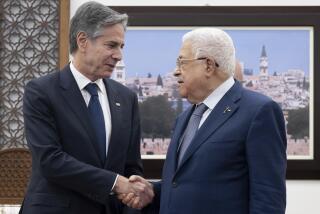U.S. Is Pressed to Act in Mideast
- Share via
WASHINGTON — In an unusually blunt assessment, a high-ranking Egyptian official on Thursday said the Bush administration’s often-repeated assertion that the U.S. cannot impose Middle East peace is not good enough and that it is time for Washington to play a much more active role mediating between Israel and the Palestinians.
“The argument that things should be left to the parties has failed--it has led to disaster,” said Osama Baz, chief foreign policy advisor to President Hosni Mubarak, whose nation is the most influential U.S. ally in the Arab world.
Talking to a small group of reporters in advance of meetings today with Secretary of State Colin L. Powell and National Security Advisor Condoleezza Rice, Baz called for creation and early deployment of a U.S.-sponsored observer force to investigate cease-fire violations on both sides.
“The mere presence of observers will be a deterrent,” he said.
State Department spokesman Philip T. Reeker said international monitors, if approved by both Israel and the Palestinians, “could be useful.”
Responding to Baz’s assertion that Israelis and Palestinians will never resolve the conflict without the intervention of the United States or some other third party, Reeker said, “Our belief [is] that attempting to force a solution by a third party on the two parties . . . will only frustrate efforts” to achieve peace.
“Obviously, the secretary does look forward to his meeting” with Baz, Reeker added, “and we’ll let that meeting take place before we try to analyze it any further.”
Baz conceded that the Bush administration is active diplomatically but said much more is needed from what he suggested is the only government that has credibility with both Israelis and Palestinians.
“We’re not saying the administration has done nothing,” he said. “But the United States has confined its role up until this minute to diplomatic efforts. That is important . . . but you need some action on the ground.”
He said Egypt has several suggestions for U.S. initiatives, but he declined to spell them out before his meetings with Powell and Rice. However, he said the need for an impartial observer force is pressing and should be addressed at once.
At the United Nations on Thursday, Palestinian representatives pushed for creation of a multinational U.N. observer force. But the Security Council is unlikely to approve the proposal because of opposition from the U.S. and Israel.
Baz acknowledged that Israel’s refusal to consider U.N. monitors closes off that option. But he said both Israel and the Palestinians have indicated that they would accept a U.S. observer force.
“If Israel will only accept U.S. observers, we will urge the United States to do it,” he said. If the administration is unwilling to send American monitors, he added, it should help establish a multinational force and persuade Israel to accept it.
Baz said he came to Washington to warn the administration that continuing Middle East violence will only increase extremism and terrorism, which “will damage our interests and yours.”
In a related development, the Bush administration seemed surprised by a Russian Foreign Ministry statement issued Wednesday that said, “In a joint stand, the United States and Russia have agreed to coordinate efforts to end more than 10 months of [Mideast] violence and pave the way to a resumption of peace talks.”
Reeker suggested that the Russian statement contained little that was new.
“Since 1991, when the Russians were our partner at the Madrid Conference, we’ve been working closely with the Russians and others in the international community--the European Union and others--obviously on this process,” he said of Middle East peace efforts. “That’s just been a continuing thing.”
Meanwhile, the White House said President Bush spoke by telephone Thursday with Israeli Prime Minister Ariel Sharon. A U.S. spokesman said the leaders agreed on the need to keep the conflict from escalating further.
Apparently reporting on the same conversation, the Israeli newspaper Haaretz said Sharon told Bush “that Israel will not escalate the situation in the region and will not lead it to war, but that it was obligated to protect the safety of its citizens.”
The prime minister said Israel will continue “preventive actions” against Palestinians planning terrorist attacks, a euphemism for Israel’s controversial policy of killing alleged militants.
More to Read
Sign up for Essential California
The most important California stories and recommendations in your inbox every morning.
You may occasionally receive promotional content from the Los Angeles Times.










